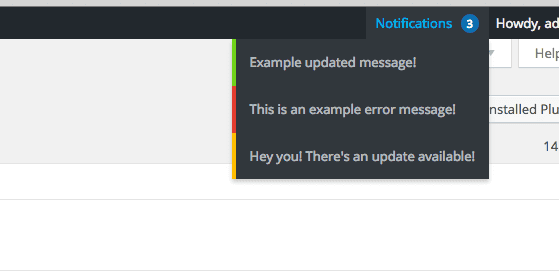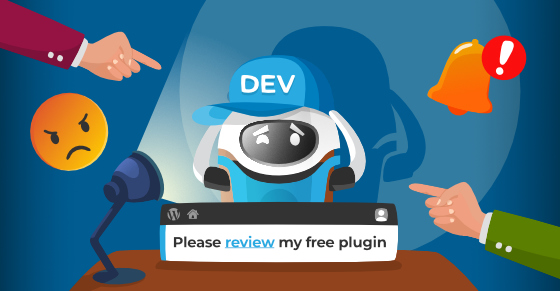|
|
Every 3 to 6 months I stumble across a trending social media thread that bashes plugin developers for overloading the WP Admin dashboard with notices. As a plugin developer myself and someone who communicates with plugin and theme developers every single day as part of my role at Freemius, it really touches a nerve to see this discussion brought up over and over again, so I want to end this misconception once and for all.
It always starts the same way.
An influencer shares a screenshot of an Admin dashboard bloated with tons of admin notices. And then a whole lot of people like and share it “blindly” – some will even passionately express their anger.
Good lord WordPress plugin authors, this is out of control. pic.twitter.com/0S42908C5T
— Scott Bolinger (@scottbolinger) July 7, 2020
I get it, admin notices suck!
We all know it and it’s very easy to relate to.
But are plugin developers really the ones to blame as a whole?
I don’t think so.
Also, this recurring trend from thought leaders spreading messages without really thinking through the ramifications of their words bothers me, especially when it comes from fellow plugin devs. Scott is a good friend, and I’ve known him for years, I’m sure he (and others) don’t have bad intentions, but messages like this de facto pin the blame on plugin developers, hurting our overall reputation in the WordPress community. We have to be more responsible in terms of what we communicate to the world.
Let me show you the other side of the coin, the plugin developer’s perspective.
Many Sites Have Many Plugins
Several years ago, I ran an analysis to assess the market share of WordPress plugins, in which I discovered that an average self-hosted WordPress site (i.e., not a site on WordPress.com) has 25.2 installed plugins, 18.3 active plugins, and 17.6 active plugins with more than 200 lines of code.
Yesterday, I dug into our database and pulled a new sample of 10,000 random sites to see how things have changed, and I found that the average number of active plugins on a site today is 15.94.
After reviewing 10,000 random sites to see how things have changed in our ecosystem, I found that the average number of active #WordPress #plugins on a site in 2020 is 15.94.
So, there was a decrease of ~2.4 plugins per site, which is great.
If you think about it, this makes total sense as site speed is becoming more and more important for SEO, and WP users today are more educated on plugins’ impact on performance. Also, the market has consolidated in the past years and larger products like Jetpack are now much richer in their offerings, so users get dozens of micro solutions in the same package, avoiding the need for additional plugins.
From the 10,000 sites, 407 have over 30 active plugins (that’s over 4%!), 46 sites have over 50 active plugins.
The point I’m trying to make is that sites with many plugins are not rare and if you spend enough time in the WP space as a freelancer, agency, service provider, or a product person, there’s a high chance you’ll log into the WP Admin dashboard of a site that has a lot of active plugins.
It’s inevitable, simple statistics.
Frequency of Admin Notices
Plugin developers use notices as one of the primary ways to communicate messages to our users and customers. For an actively developed plugin, one notification per month is very reasonable, as significant features, updates, or changes may be relevant to the site admin after periods even less than 30 days.
Back to numbers.
If a plugin adds one admin notice per month, a site with 30+ active plugins will get exposed to 30 notices, one notice on avg. per day – and I’m not even considering the notices from core.
Infrequent Admin Notices Handling/Dismissals
More food for thought – how frequently do you think website administrators actually log into their WP Admin dashboard?
Unfortunately, we don’t have access to such data (if you have it, we would love to invite you for a guest post!), but from our own experience and acquaintance with the ecosystem, admins generally don’t login as frequently as many people think.
My team and I are very active on content, producing articles on an almost weekly basis. I dare say that our team is probably more active than the average WordPress site. That said, while our writers and editors log into the dashboard at least several times a week, they are focused on content, and it’s not their responsibility to administer the website and handle/dismiss admin notices.
The team members that are actually qualified and delegated to manage notices sign in on demand and typically for the following purposes:
- Updating a plugin in case of security vulnerability discovery
- Updating core once in a while
- Fixing bugs
- Installing new plugins
All of the above actions are infrequent, even rare.
I’m certain that we’ve also had months in which we didn’t clean up notices at all, and I’ll bet that we are not unique and many companies have similar routines.
Obviously, when working on a new site or revamping an existing one, the log in frequency of developers is much higher, but once the site is ready, things move from design & development to ongoing maintenance.
Subscribe and grab a free copy of our WordPress Plugin Business Book
Exactly how to create a prosperous WordPress plugin business in the subscription economy.

“Number rules the universe” – Pythagoras
Now let’s combine all the numbers.
Considering the previous example of 30 plugins on a site with 1 notification per day, if a user doesn’t log in after 10 days, there will be 10 notices, which is clearly overwhelming, time-consuming, and overall just terrible from a UX perspective.
All in all, it’s easy to blame plugin developers since these notifications are indeed triggered by plugins. But, what I’d like to argue here is that this is only a symptom of the underlying problem.
The admin notices clutter created by plugins and themes is just a symptom of the real problem.
Outdated WP Admin Notices Mechanism
While WordPress has grown enormously in so many aspects, including the vibrant and amazing plugins ecosystem that today has tens of thousands of products, core’s admin notices mechanism barely evolved since its launch with version 3.1 – 10 years ago!
The core admin notice mechanism was simply never meant to process the high quantity of notices we now have in the ecosystem. So inevitably, site admins end up complaining about their negative experiences.
There have been tons of discussions on this topic over the years, many trying to advocate for a change. Barry Kooij developed a beautiful solution back in 2015 that converts admin notices into a modern notification center:

Somehow, it was never important enough to get prioritized and added to core.
There are also plugins that let you solve this problem like Disable Admin Notices Individually, but, again, they require an extra plugin to be installed instead of adding this feature to core.
The “biggest” update to admin notices was added in WordPress 4.2 (5 years ago!), which introduced an option to add a dismissal button to notices, yet, that didn’t even provide a structured way to store the notice visibility state, again, leaving it up to plugin developers.
WordPress 4.2 added support for dismissing admin notices but didn't provide a way to persist the state of a notice once it had been dismissed, leaving it up to plugin developers to roll their own methods.https://t.co/FzDPNgB1Fd#WordPress #webdev
— Iain Poulson (@polevaultweb) January 25, 2018
Syed Balkhi advocated for a notification center on WPBeginner back in 2016, and some plugins like Yoast SEO took it to the next level and ended up implementing their own notifications solution to reduce clutter, which leads to fragmented user experiences and requires a bunch of extra code that should simply be in core.
Plugin developers use admin notices because that’s all that we have to work with out-of-the-box. We get lemons and try to squeeze the best lemonade we can.
Let me be clear: I acknowledge that prioritization is exceptionally challenging when trying to satisfy ~38% of the web 🙂 So, I’m not pointing fingers at anyone, just stating facts and raising awareness. If there’s a community consensus that admin notices are so annoying and distracting, perhaps it’s the time to examine an alternative communications solution.
Constant Battle Between Give & Take
It’s hard enough for plugin & theme developers to find the balance between how much to give vs. how much to ask in return. In such an opinionated ecosystem like WordPress, every user is a potential blogger, so every time we make product changes or communicate with users we have to walk on eggshells trying not to upset anyone with the fear of getting a dreaded 1-star review.
We all know how some people love to express their frustrations by ranting in reviews, effectively holding developers hostage with often unreasonable expectations.
Let me put it this way.
Many notices are transactional and meant to communicate something important to the admin, like critical updates. Even for the more promotional notices, if a user gets a free product, I believe it’s a fair deal that the developer has a right to add an admin notice every so often.
Whether it’s a review request, a little upsell to check the paid offering, or an invitation to join their affiliate program – these are all justified.
At the end of the day, it’s a symbiotic relationship, and that’s what we all need to remember.
Plugin & theme developers are trying to build the best offerings they can for their target audience, but if we don’t ask for anything in return, how are we supposed to grow our teams and sustain a growing user base that demands more features and support?
You might ask: “But Vova, what about purely free, open-source plugins without any commercial incentives?”
That’s a valid point, in theory. In reality, the most popular plugins & themes on the market are commercial, and they have a team of people behind them working their asses off to keep users happy. They need to get paid to sustain their families and put food on the table, so naturally we must operate as a business (of course, there are some exceptions).
The holistic utopia where developers build products for the sake of open-source is unrealistic and unsustainable. A single developer that works on a product as a hobby in their spare time will never be able to deliver the same level of quality and manage to sustain it for a long period like a fully-committed business can.
You can read more about this topic here.
Leave Criticism to Users of the Plugin
After Yoast ran their last Black Friday sale promotion in the form of an admin notice banner, their users immediately cast their dissatisfaction through negative feedback everywhere you can imagine. In just a few days they received over one hundred 1-star reviews on WordPress.org.
Not only did that impact their brand, they had to spend time and tons of energy responding to those 1-star reviews, a flood of support tickets, social interactions, bad publicity, and more.
Do you think they would have done that if they had known the negative impact it would have?
Absolutely not!
Crises like that are emotionally draining, and the last thing plugin developers/companies want to deal with. I know the Yoast team, and while money is essential for their business growth, money is definitely not their main driver. Like most product companies, their passion is in “creating” and serving their users, while following their mission.
They simply ran an experiment, which ended up being a (very) bad decision.
That BlackFridayBanner was not the best idea. We’re truly sorry for the annoyance and difficulties it may have caused. We did not think this through properly. If you want, you can update to a new version of our plugin without that banner. #blackfriday #neveragain #apologies
— Marieke van de Rakt (@MariekeRakt) November 28, 2019
I’m pretty confident that they won’t repeat this practice any time soon 😉
We have our own users and customers already holding us accountable for every action we take. And trust me, they are doing a superb job and don’t have any shame to bluntly cast opinions through reviews, social media, and anywhere else you can imagine.
Stop Ruining Plugin Developers’ Reputation
While I’m sure there are some plugins that are more aggressive on promotional notices, overall, we, product developers, are humans that are just trying to serve our users & customers while also trying to make a living. The vast majority of us have no evil or hidden agenda. We also use WordPress and other plugins, and are much more sensitive to all these finer nuances than you might think.
After all, many of the leaders that express their concern about the admin notices’ clutter are plugin developers themselves.
So…
Dear community, please stop criticizing plugin developers as a whole and spreading negative sentiment towards the people that work hard every day to help users fulfill their goals and aspirations through their WordPress sites – it is just wrong and unfair.
Dear community, please stop criticizing plugin developers as a whole and spreading negative sentiment towards the people that work hard every day to help users fulfill their goals and aspirations through their WordPress sites – it is just wrong and unfair.









When you build a plugin, it's easy to imagine that it's the most important thing in your customer's life. I think that a lot of plugin developers are guilty of this.
Admin notices serve an important purpose, but many plugin companies are mis-using them. It's entirely appropriate to display a notice throughout the admin to tell administrators about critical issues, but I don't think it's fair to use them for marketing purposes. By all means, add a promotional area or a notice to the settings page for your own plugin - but don't clutter up every page of the admin by asking users to leave a review, to tell them about a new feature, or for any other non-essential purpose.
At Barn2, we always try to put our plugins into the appropriate context within the WordPress admin. This extends far beyond admin notices. For example:
- We only show sitewide dashboard notices if there is an urgent issue that actually means the plugin isn't working on their site.
- We never redirect users to a specific page when they first activate one of our plugins because we understand that people might be installing one of our plugins to set up later, or re-activating it as part of a wider troubleshooting process.
- We never add top level links to our settings pages because we have seen how other plugin companies do this, and how much clutter it creates on sites with many plugins. Instead, we structure our settings pages into the appropriate location - which is under Settings > General, or (for WooCommerce extensions) under WooCommerce > Settings, and so on.
If everyone followed these principles then the WordPress admin would be much easier to work with, even for sites with lots of plugins installed.
Thanks for stopping by, Katie.
In a premium-only world, I agree with everything you said about the notices. But it's important to differentiate between premium-only plugins, like yours, to freemium products.
Premium plugin & theme shops selling from their own store have access to all of their users' emails, which provides a great channel to communicate updates and promotions.
In the freemium space, the vast majority (~98%) of users are using the product for free, so there's no way to communicate a message to your entire userbase without relying on in-dashboard notices.
When you develop, maintain, and support a good piece of software for a user base that mostly doesn't pay you anything, naturally, developers want to ask something back for their ongoing efforts. As long as those notices are dismissable and don't take too much real estate, I think it's a fair deal. And if some users feel that the value they get doesn't worth the notices of a particular product, they can always cast their opinion to the company through reviews/support/whatever, or uninstall the plugin and use another one.
Every product is different, and every product's audience is different. As long as there no abuse, we shouldn't be the judges; the users of the products should.
Thanks Vova!
Our freemium plugins just promote the premium version on the settings page, and we don't have any dashboard nags.
Of course, what you say is a good reason to use Freemius Insights - as that provides a way for free plugin developers to get their users' email addresses, so they can contact them in a more appropriate way.
WooCommerce stores end up with 60-80 active plugins by the nature of payment gateways and additional features in plugins.
In my opinion there's no excuse for adding "please rate my plugin" or "please upgrade to pro" on every page in the admin. The only sane place for such notices is on the plugin's settings page.
I really can't understand why some people seem to think it's a good idea to just go screaming all over the dashboard.